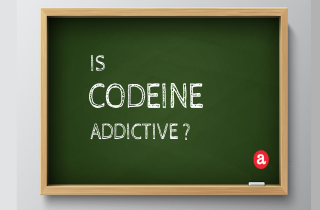YES. Codeine is addictive.
In fact, the Controlled Substances Act schedules codeine narcotic drug. So while codeine stays in the system for a only a couple of days, it is actually VERY addictive. If you or someone you care about are struggling with addiction to codeine…help is available. So, get ready to get better! You can learn more about codeine addiction, available treatment options, and rehab programs in our comprehensive guide for Codeine Addiction Treatment Programs and Help. We invite your questions about the addictive potential of codeine at the end.
What is codeine used for?
Codeine is a mild narcotic used in a variety of medications, including painkillers and cough medications to reduce pain or coughing. Codeine may be dispensed as a tablet or oral solution, and is usually mixed with other medications. Often, the amount of codeine in these products is very low. Sometimes people will abuse codeine-containing products by taking them in very large amounts, but this can be dangerous and lead to potential overdose and/or drug addiction.
What is codeine made of?
Codeine is an opium-derived synthetic substance. Unlike a true opiate, which would come from nature and be derived from the opium poppy, codeine is created in a lab.
How addictive is codeine?
Codeine is very addictive – it’s actually a Schedule II controlled substance in the US due to its high addictive potential. Unfortunately, codeine is frequently abused to create a euphoric high This is why it is illegal to use codeine without a prescription from a doctor. However, because codeine is usually only present in small amounts in many prescription medications, it takes serious abuse to develop an addiction.
How addictive a drug is doesn’t just depend on its chemical properties. Social and cultural factors also heavily influence the availability of codeine to the general public. For exaple, some other factors which make codeine so easy to get addicted to are:
- codeine availability
- codeine’s extractability
- the ease of codeine synthesis in the lab
- illegal diversion history of codeine
- prescribing doctor’s attitudes toward codeine
- local controls and state laws on codeine
- widespread awareness of codeine action
Codeine dependence vs. addiction
It’s important to remember that codeine dependence is not necessarily the same as codeine addiction. Someone who uses the medication responsibly and for legitimate medical reasons can become dependent on the medication. But this doesn’t indicate addiction. A dependence on codeine simply means that person is unable to stop using codeine without side effects (withdrawal syndrome). This usually occurs after long-term use of codeine for pain management.
An addiction is much more serious than a physical dependence on codeine. Not only can a codeine addiction involve a tolerance to the medication, requiring greater and greater doses to achieve the same level of pain relief, but an addict will also experience strong psychological cravings for the drug. Codeine addicts may compulsively use codeine despite the negative consequences of their actions, resulting in increasingly severe consequences over time.
How do you get addicted to codeine?
It’s more likely you’ll become addicted when you make a conscious decision to abuse codeine. Some ways that people misuse and abuse codeine are:
- chewing codeine-containing pills to prevent controlled release
- crushing codeine medications into a powder and snorting codeine
- crushing codeine to dissolve in water and inject
- taking codeine in higher doses than prescribed
- taking codeine more frequently than prescribed
To be clear, taking codeine to get high will lead to codeine addiction. If you’re taking larger doses than prescribed to try to achieve psychoactive effects, you’re misusing the drug. You’re much more likely to become addicted when you do this. In general, you can get addicted to codeine if you take it in a manner other than normally prescribed. Plus, you’re at a higher risk of codeine addiction if you’ve been addicted to other drugs or alcohol in the past.
On the other hand, if you are using codeine to manage a legitimate medical condition, codeine addiction is possible, but much less likely. As long as you are taking codeine as directed by your doctor and don’t feel strong cravings for the drug, you probably aren’t addicted. Remember, you can experience withdrawal symptoms from codeine without having a codeine addiction!
Signs of codeine addiction
It’s true that codeine dependence and addiction can be hard to tell apart, but you’ll be able to tell the difference if you remember that codeine addiction involves a psychological craving for the drug. Furthermore, you may be addicted to codeine if you need to take it to deal with normal stresses in daily life. Other signs of codeine addiction include:
- Continued codeine abuse despite negative consequences.
- Craving codeine and using it compulsively.
- Seeking codeine in order to stimulate the “reward center” of the brain.
Codeine addiction potential questions
Do you still have questions about codeine addiction potential? Please leave them here. We are happy to help answer your questions personally and promptly. If we do not know the answer to your particular question, we will refer you to someone who does.









Related Posts